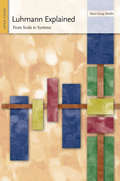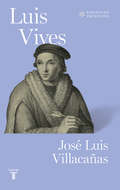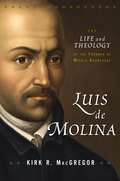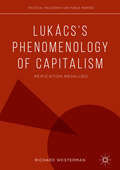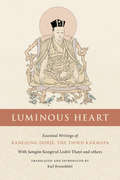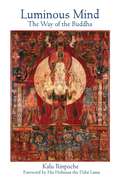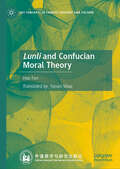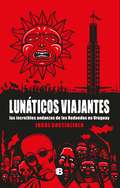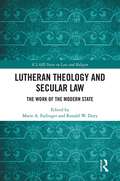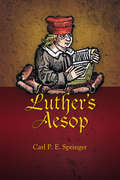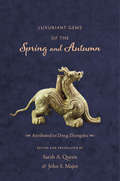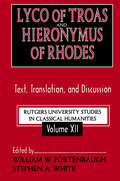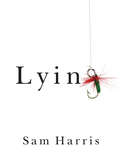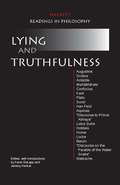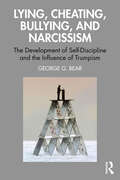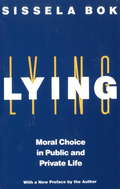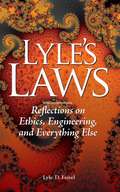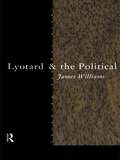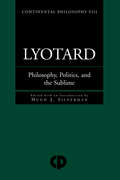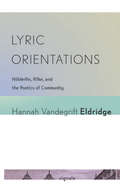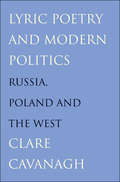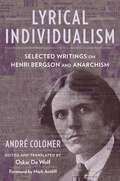- Table View
- List View
Luhmann Explained
by Hans-Georg MoellerWhat are systems? What is society? What happens to human beings in a hypermodern world? This book is an introduction to Niklas Luhmann's social system theory which explains specific functions like economy and mass media from a cybernetic perspective. Integrating various schools of thought including sociology, philosophy and biology Luhmann Explained results in an overall analysis of "world society". Special attention is given to the present-day relevance of Luhmann's theory with respect to globalization, electronic mass media, ethics, and new forms of protest.
Luis Vives
by Jose Luis VillacañasEl retrato de nuestro primer filósofo moderno. Ortega y Gasset, quizá distanciándose de su maestro Bonilla y San Martín, autor de una aparatosa biografía de Luis Vives, sentenció con su rotundidad característica que la vida del filósofo valentino se reducía a nacer, estudiar, escribir y morir. Sin embargo, Vives oculta una historia apasionante. Ni la pretenciosa biografía de Bonilla ni la minimalista descripción de Ortega dicen la verdad de Vives. Con el paso del tiempo, y dejando atrás las increíbles manipulaciones de la época de Franco, un grupo importante e internacional de estudiosos ha multiplicado el conocimiento sobre nuestro primer filósofo moderno. Recogiendo todo ese saber, esta biografía ordena la existencia de Vives como ejemplo de un tipo humano excepcional, que supo ver la constelación inaugural de la modernidad, en toda su problemática complejidad, con los ojos de un sefardita valenciano, perotambién con la mente de un humanista europeo. De este modo supo mantener con firmeza su intenso sentido de la filiación, de la concordia y la fidelidad a la patria, pero sin entregar su espíritu crítico y reformador. ------- La colección Españoles Eminentes la forman una serie de biografías de destacadas personalidades españolas que por su excelencia moral o humanística destacaron en su época y siguen teniendo vigencia en la conciencia colectiva. Con ella se pretende analizar la historia de la cultura española a la luz de la ejemplaridad de determinados nombres que carecen todavía de una biografía verdaderamente moderna. El propósito es hacer una aportación real a este género y contribuir al conocimiento de nuestra historia a la vez que se traza la trayectoria de fi guras que por sus méritos sobresalientes y su general reconocimiento pueden ejercer una infl uencia vertebradora en la sociedad actual.
Luis de Molina: The Life and Theology of the Founder of Middle Knowledge
by Kirk R. MacgregorWhen Luis de Molina died in Madrid in 1600, he had every reason to believe he was about to be anathametized by Pope Clement VIII. The Protestant Reformation was splitting Europe, tribunals of the Inquisition met regularly in a dozen Spanish cities, and the Pope had launched a commission two years earlier to investigate Molina’s writings. Molina was eventually vindicated, though the decision came seven years after his death. In the centuries that followed Molina was relegated to relatively minor status in the history of theology until a renaissance of interest in recent years. His doctrine of God’s “middle knowledge,” in particular, has been appropriated by a number of current philosophers and theologians, with apologist William Lane Craig calling it “one of the most fruitful theological ideas ever conceived.” In Luis de Molina: The Life and Theology of the Founder of Middle Knowledge, author Kirk R. MacGregor outlines the main contours of Molina’s subtle and far-reaching philosophical theology, covering his views on God’s foreknowledge, salvation and predestination, poverty and obedience, and social justice. Drawing on writings of Molina never translated into English, MacGregor also provides insight into the experiences that shaped Molina, recounting the events of a life fully as dramatic as any of the Protestant Reformers. With implications for topics as wide-ranging as biblical inerrancy, creation and evolution, the relationship between Christianity and world religions, the problem of evil, and quantum indeterminacy, Molina’s thought remains as fresh and relevant as ever. Most significantly, perhaps, it continues to offer the possibility of a rapprochement between Calvinism and Arminianism, a view of salvation that fully upholds both God’s predestination and human free will. As the first full-length work ever published on Molina, Kirk MacGregor’s Luis de Molina provides an accessible and insightful introduction for scholars, students, and armchair theologians alike.
Lukács After Communism: Interviews with Contemporary Intellectuals
by Eva L. CorredorSince the collapse of communism in Eastern Europe, the validity of Marxism and Marxist theory has undergone intense scrutiny both within and outside the academy. In Lukács After Communism, Eva L. Corredor conducts ten lively and engaging interviews with a diverse group of international scholars to address the continued relevance of György Lukács's theories to the post-communist era. Corredor challenges these theoreticians, who each have been influenced by the man once considered the foremost theoretician of Marxist aesthetics, to reconsider the Lukácsean legacy and to speculate on Marxist theory's prospects in the coming decades. The scholars featured in this collection--Etienne Balibar, Peter Bürger, Terry Eagleton, Fredric Jameson, Jacques Leenhardt, Michael Löwy, Roberto Schwarz, George Steiner, Susan Suleiman, and Cornel West--discuss a broad array of literary and political topics and present provocative views on gender, race, and economic relations. Corredor's introduction provides a biographical synopsis of Lukács and discusses a number of his most important theoretical concepts. Maintaining the ongoing vitality of Lukács's work, these interviews yield insights into Lukács as a philosopher and theorist, while offering anecdotes that capture him in his role as a teacher-mentor.
Lukács’s Phenomenology of Capitalism: Reification Revalued (Political Philosophy and Public Purpose)
by Richard WestermanThis book offers a radical new interpretation of Georg Lukács’s History and Class Consciousness, showing for the first time how the philosophical framework for his analysis of society was laid in the drafts of a philosophy of art that he planned but never completed before he converted to Marxism. Reading Lukács’s work through the so-called “Heidelberg Aesthetics” reveals for the first time a range of unsuspected influences on his thought, such as Edmund Husserl, Emil Lask, and Alois Riegl; it also offers a theory of subjectivity within social relations that avoids many of the problems of earlier readings of his text. At a time when Lukács’s reputation is once more on the rise, this bold new reading helps revitalize his thought in ways that help it speak to contemporary concerns.
Luminous Heart: Essential Writings of Rangjung Dorje, the Third Karmapa
by Rangjung Dorje Jamgön Kongtrul TayéAn extraordinary collection of writings on buddha nature by the Third Karmapa Rangjung Dorje (1284-1339)--now in paperback.The Third Karmapa Rangjung Dorje's unique and balanced view synthesizes Yogācāra Madhyamaka and the classical teachings on buddha nature. His work focuses on the transition from ordinary deluded consciousness to enlightened wisdom, the characteristics of buddhahood, and a buddha's enlightened activity. Included are commentaries by Jamgön Kongtrul Lodrö Tayé that supplement the view of the Third Karmapa on two fundamental treatises on buddha nature, emphasizing the luminous empty mind of buddha nature as presented by the great Indian masters Maitreya and Asaṅga. For those practicing the sutrayāna and the vajrayāna in the Kagyü tradition, what these texts describe can be transformed into living experience.
Luminous Mind: The Way of the Buddha
by His Holiness the Dalai Lama Kyabje Kalu RinpocheLuminous Mind is a remarkable compilation of the oral and written teachings of the late Kalu Rinpoche - who was called "a beacon of inspiration" by the Dalai Lama. A master of meditation and leader of the Shangpu Kagyu school of Tibetan Buddhism, Kalu Rinpoche taught with an inviting, playful and lucid style that was just one natural manifestation of his own profound realization. The teachings presented in Luminous Mind are immediate and timeless. <P> As the Dalai Lama notes in his foreword, Luminous Mind covers "the full range of Buddhist practice from the basic analysis of the nature of the mind up to its ultimate refinement in the teachings of Mahamudra." This anthology of Kalu Rinpoche's writings and oral teachings resonates with his wisdom and compassion. <P> Comparing Kyabje Kalu Rinpoche with Milarepa, the greatest mediation master Tibet has ever known, His Holiness the Dalai Lama extols the author of Luminous Mind as a "beacon of inspiration" for spiritual practitioners of all traditions. Noting that "there have been few like him before or since," His Holiness urges us to delve into this remarkable anthology of the late Kalu Rinpoche's essential instructions so that we may encounter "the full range of Buddhist practice from the basic analysis of the nature of the mind up to its ultimate refinement in the teachings of Mahamudra." Drawn from both his lucid writings and his eloquent oral presentations, this unprecedented book lays bare the full grandeur of Kalu Rinpoche's legacy. At the same time, the gentle words and playful stories of this master of meditation are filled with a depth of clarity and warmth that could only arise from a profound realization of both wisdom and compassion.
Lunli and Confucian Moral Theory (Key Concepts in Chinese Thought and Culture)
by Hao FanThis book interprets the concepts, philosophies and cultural traditions of lunli (roughly construed as “relationships and rationality”) from the perspective and domain of ‘dialogue civilization.’ On the conceptual level, it expounds the common reference and different tenets of the Chinese lunli and the Western “ethic”, exploring the characteristics of lunli and "ethic" in civilization history, considering notably the difference between unification of family and state and division of the two at the embryonic stage of civilization. The book draws on the lunli-oriented culture and religion-based culture to demonstrate the difference between Chinese lunli and Western “ethic” in their respective top design and ultimate care, by exploring the issue “What the world would be like, if there were no lunli” for the Chinese and “What the world would be like, if there were no God” for westerners. Since lunli is the most prominent feature of “being Chinese”, or the most symbolic and interpretative Chinese cultural concept, this pivot provides a key introduction for Western readers not only to the concept itself, but also to modern day Chinese culture.
Lunáticos viajantes: Las increíbles andanzas de Los Redondos en Uruguay
by Jorge CostiglioloA 20 años de su último recital en Montevideo conoceremos la historia, anécdotas y protagonistas de una relación de amor, pasión y rock and roll. Desde su nacimiento a fines de los años 70 en la de La Plata Patricio Rey y sus redonditos de ricota se convirtieron en un fenómeno cultural casi exclusivo de Argentina, salvo por Uruguay. Este libro repasa a través de testimonios, historias, anécdotas, mitos, verdades y leyendas las veces de cómo, cuándo y de qué manera Los Redondos se vincularon con Uruguay.
Lutheran Theology and Secular Law: The Work of the Modern State (ICLARS Series on Law and Religion)
by Ronald W. Duty Marie A. FailingerThis collection brings together lawyers and theologians in the U.S. and Europe to reflect on Lutheran understandings of the political use of the law by secular governments. The book furthers the intellectual conversation about how Lutheran insights can be used to develop jurisprudence and specific solutions to legal issues in which there is strong conflict. It presents the basic theological and interpretive assumptions of the Lutheran tradition as they may inform the creation of legislation and judicial interpretation at local, national and international levels. The authors explore Luther’s conception of the foundations of modern secular law and understanding of vocation. The work discusses the application of Lutheran theological principles to contemporary issues such as the war on terror, native land rights, property law, family law, church and state, medical experimentation, and the criminal law of rape, providing ethical insights for lawyers and lawmakers.
Luther’s Aesop (Early Modern Studies #8)
by Carl P. SpringerReformer of the church, biblical theologian, and German translator of the Bible Martin Luther had the highest respect for stories attributed to the ancient Greek author Aesop. He assigned them a status second only to the Bible and regarded them as wiser than "the harmful opinions of all the philosophers." Throughout his life, Luther told and retold Aesop’s fables and strongly supported their continued use in Lutheran schools. In this volume, Carl Springer builds on the textual foundation other scholars have laid and provides the first book in English to seriously consider Luther’s fascination with Aesop’s fables. He looks at which fables Luther knew, how he understood and used them, and why he valued them. Springer provides a variety of cultural contexts to help scholars and general readers gain a deeper understanding of Luther’s appreciation of Aesop.
Luther’s Aesop (Early Modern Studies)
by Carl P. SpringerReformer of the church, biblical theologian, and German translator of the Bible Martin Luther had the highest respect for stories attributed to the ancient Greek author Aesop. He assigned them a status second only to the Bible and regarded them as wiser than "the harmful opinions of all the philosophers." Throughout his life, Luther told and retold Aesop’s fables and strongly supported their continued use in Lutheran schools. In this volume, Carl Springer builds on the textual foundation other scholars have laid and provides the first book in English to seriously consider Luther’s fascination with Aesop’s fables. He looks at which fables Luther knew, how he understood and used them, and why he valued them. Springer provides a variety of cultural contexts to help scholars and general readers gain a deeper understanding of Luther’s appreciation of Aesop.
Luther’s Legacy: The Thirty Years War and the Modern Notion of ‘State’ in the Empire, 1530s to 1790s
by Robert Von FriedeburgIn this new account of the emergence of a distinctive territorial state in early modern Germany, Robert von Friedeburg examines how the modern notion of state does not rest on the experience of a bureaucratic state-apparatus. It emerged to stabilize monarchy from dynastic insecurity and constrain it to protect the rule of law, subjects, and their lives and property. Against this background, Lutheran and neo-Aristotelian notions on the spiritual and material welfare of subjects dominating German debate interacted with Western European arguments against 'despotism' to protect the lives and property of subjects. The combined result of this interaction under the impact of the Thirty Years War was Seckendorff's Der Deutsche Fürstenstaat (1656), constraining the evil machinations of princes and organizing the detailed administration of life in the tradition of German Policey, and which founded a specifically German notion of the modern state as comprehensive provision of services to its subjects.
Luxuriant Gems of the Spring and Autumn (Translations from the Asian Classics)
by Zhongshu DongThe Spring and Autumn (Chunqiu) is a chronicle kept by the dukes of the state of Lu from 722 to 481 B.C.E. Luxuriant Gems of the "Spring and Autumn" (Chunqiu fanlu) follows the interpretations of the Gongyang Commentary, whose transmitters sought to explicate the special language of the Spring and Autumn. The work is often ascribed to the Han scholar and court official Dong Zhongshu, but, as this study reveals, the text is in fact a compendium of writings by a variety of authors spanning several generations. It depicts a utopian vision of a flourishing humanity that they believed to be Confucius's legacy to the world.The Gongyang masters thought that Confucius had written the Spring and Autumn, employing subtle phrasing to indicate approval or disapproval of important events and personages. Luxuriant Gems therefore augments Confucian ethical and philosophical teachings with chapters on cosmology, statecraft, and other topics drawn from contemporary non-Confucian traditions. A major resource, this book features the first complete English-language translation of Luxuriant Gems, divided into eight thematic sections with introductions that address dating, authorship, authenticity, and the relationship between the Spring and Autumn and the Gongyang approach. Critically illuminating early Chinese philosophy, religion, literature, and politics, this book conveys the brilliance of intellectual life in the Han dynasty during the formative decades of the Chinese imperial state.
Lyco of Troas and Hieronymus of Rhodes: Text, Translation, and Discussion (Rutgers University Studies in Classical Humanities)
by Stephen WhiteVolume 12 in the RUSCH series continues work already begun on the School of Aristotle. It focuses on two Peripatetic philosophers who lived in the third century BCE, when Stoicism and Epicureanism flourished. Lyco of Troas was the third head of the Peripatos after Aristotle. Hieronymus of Rhodes was a member of the school and an antagonist of Lyco.Excellence in teaching was Lyco's distinguishing attribute, but he also attracted benefactors and had the reputation of being a bon vivant. Hieronymus is best known for his work on ethics, but he also wrote on literature, history, and rhetoric. Our understanding of the work being done in the Peripatos during the third century BCE will be greatly enhanced by Peter Stork's new edition of Lyco and Stephen White's edition of Hieronymus.The two editions in this volume are accompanied by full translations as well as notes on the Greek and Latin texts (an apparatus criticus) and substantive notes that accompany the translation. The editions will replace those of Fritz Wehrli, which were made over half a century ago and published without an accompanying translation. In addition to the two editions, this volume includes ten essays that address significant themes presented by the texts. Three of the essays deal with biographical material: "Diogenes Life of Lyco" (J orgen Mejer), "Hieronymus in Athens and Rhodes" (Elisabetta Matelli), and "Peripatetic Philosophers as Wandering Scholars" (Peter Scholz). Four develop philosophical topics: "Hieronymus of Rhodes on Vision" (Todd Ganson), "The Historical Setting of Hieronymus fr. 10 White" (Peter Lautner), "Peripatetic Reactions to Hellenistic Epistemology" (Hans Gottschalk), and "Lyco and Hieronymus on the Good Life" (Stephen White). Three concern rhetoric and literature: "Lyco Phrastikos" (William Fortenbaugh), "Hieronymus on Isocrates' Style" (David Mirhady), and "Hieronymus in Ancient Commentaries on Hesiod's Shield" (Andrea Martano).
Lying
by Sam HarrisAs it was in Anna Karenina, Madame Bovary, and Othello, so it is in life. Most forms of private vice and public evil are kindled and sustained by lies. Acts of adultery and other personal betrayals, financial fraud, government corruption-even murder and genocide-generally require an additional moral defect: a willingness to lie.In Lying, best-selling author and neuroscientist Sam Harris argues that we can radically simplify our lives and improve society by merely telling the truth in situations where others often lie. He focuses on "white" lies-those lies we tell for the purpose of sparing people discomfort-for these are the lies that most often tempt us. And they tend to be the only lies that good people tell while imagining that they are being good in the process.
Lying and Truthfulness
by Kevin Delapp Jeremy HenkelThis anthology provides a set of distinctive selections that explore both Western and Eastern views of lying and truthfulness, including selections from Augustine, Grotius, Aristotle, the Mahābhārata, Confucius, Kant, Plato, Sunzi, Han Feizi, Aquinas, the Lotus Sutra, Hobbes, Hume, Locke, Bacon, Nietzsche, and more. Hackett Readings in Philosophy is a versatile series of compact anthologies, each devoted to a topic of traditional interest in philosophy or political theory. Selections are chosen for their accessibility, significance, and ability to stimulate thought and discussion.
Lying, Cheating, Bullying and Narcissism: The Development of Self-Discipline and the Influence of Trumpism
by George G. BearThis vibrant book examines individual and societal factors contributing to the rise of lying, cheating, bullying, and narcissism, with emphasis on the influence of Trumpism and the valuing of “getting things done” over the importance of self-discipline and issues of morality. George Bear explores individual and environmental factors that influence the development of self-discipline. He examines reasons for the growing prevalence of lying, cheating, bullying, and narcissism and their underlying factors, and the role of parenting and peer relationships in their development. The volume highlights the critical roles that moral reasoning, moral emotions, and mechanisms of moral disengagement play in dishonest and harmful behavior. Lying, Cheating, Bullying, and Narcissism is for students and scholars of child development, parenting, psychopathology, and criminology; professionals in psychology, mental health, and education; as well as others interested in the prevalence and roots of lying, cheating, bullying, and narcissism in America.
Lying: Moral Choice in Public and Private Life
by Sissela BokA thoughtful addition to the growing debate over public and private morality. Looks at lying and deception in law, family, medicine, government.
Lyle's Laws: Reflections on Ethics, Engineering, and Everything Else
by Lyle D. FeiselThe author brings a very personal dimension to his commentary by sharing anecdotes about growing up on a farm, parenting three children, and traveling the world. Without preaching, he offers ideas on-and acknowledges the challenges of-conducting oneself appropriately, making good decisions, and navigating tough times. Educators and students will find Lyle's Laws to be a useful guide for courses on professional ethics and career preparation.
Lyotard and the Political (Thinking the Political)
by James WilliamsLyotard and the Political is the first book to consider the full range of the political thought of the French philosopher François Lyotard and its broader implications for an understanding of the political. James Williams clearly and carefully traces the development of Lyotard's thought from his early Marxist essays on the Algerian struggle for independence to his break with the thought of Marx and Freud. This is compared with Lyotard's later, highly influental writings on the politics of desire and his attempts to base a postmodern political discourse on the sublime. An indispensable work for all who are interested in modern continental philosophy, Lyotard and the Political offers the first systematic analysis of the political dimension of the work of one of the most controversial and influential philosophers of the twentieth century. Also available in this series: Lacan and the Political Pb: 0-415-17187-3: £12.99 Heidegger and the Political Pb:0-415-13064-6: £12.99 Derrida and the Political Pb: 0-415-10967-1: £13.99 Nietzche and the Political Pb: 0-41510069-0: £12.99 Foucault and the Political Pb: 0-415-10066-6: £12.99
Lyotard: Philosophy, Politics and the Sublime (Continental Philosophy #Vol. 8)
by Hugh J. SilvermanFirst published in 2003. Routledge is an imprint of Taylor & Francis, an informa company.
Lyric Orientations: Hölderlin, Rilke, and the Poetics of Community
by Hannah Vandegrifte EldridgeIn Lyric Orientations, Hannah Vandegrift Eldridge explores the power of lyric poetry to stir the social and emotional lives of human beings in the face of the ineffable nature of our mortality. She focuses on two German-speaking masters of lyric prose and poetry: Friedrich Hölderlin (1770-1843) and Rainer Maria Rilke (1875-1926). While Hölderlin and Rilke are stylistically very different, each believes in the power of poetic language to orient us as social beings in contexts that otherwise can be alienating. They likewise share the conviction that such alienation cannot be overcome once and for all in any universal event. Both argue that to deny the uncertainty created by the absence of any such event (or to deny the alienation itself) is likewise to deny the particularly human condition of uncertainty and mortality. By drawing on the work of Stanley Cavell, who explores how language in all its formal aspects actually enables us to engage meaningfully with the world, Eldridge challenges poststructuralist scholarship, which stresses the limitations--even the failure--of language in the face of reality. Eldridge provides detailed readings of Hölderlin and Rilke and positions them in a broader narrative of modernity that helps make sense of their difficult and occasionally contradictory self-characterizations. Her account of the orienting and engaging capabilities of language reconciles the extraordinarily ambitious claims that Hölderlin and Rilke make for poetry--that it can create political communities, that it can change how humans relate to death, and that it can unite the sensual and intellectual components of human subjectivity--and the often difficult, fragmented, or hermetic nature of their individual poems.
Lyric Poetry and Modern Politics
by Clare CavanaghLyric Poetry and Modern Politics explores the intersection of poetry, national life, and national identity in Poland and Russia, from 1917 to the present. As a corrective to recent trends in criticism, acclaimed translator and critic Clare Cavanagh demonstrates how the practice of the personal lyric in totalitarian states such as Russia and Poland did not represent an escapist tendency; rather it reverberated as a bold political statement and at times a dangerous act. Cavanagh also provides a comparative study of modern poetry from the perspective of the eastern and western sides of the Iron Curtain. Among the poets discussed are Blok, Mayakovsky, Akhmatova, Yeats, Whitman, Frost, Szymborska, Zagajewski, and Milosz; close readings of individual poems are included, some translated for the first time. Cavanagh examines these poets and their work as a challenge to Western postmodernist theories, thus offering new perspectives on twentieth-century lyric poetry.
Lyrical Individualism: Selected Writings on Henri Bergson and Anarchism (Columbia Themes in Philosophy, Social Criticism, and the Arts)
by Andre ColomerIn the early twentieth century, André Colomer was perhaps the best-known figure in the anarchist movement. A poet, philosopher, activist, and public speaker, he was enmeshed in the Parisian political and artistic scene at a time of political and cultural revolution. Amid the avant-garde explosions of Cubism, futurism, and surrealism and the ferment of radical politics on left and right, Colomer became anarchism’s leading advocate. He galvanized the Parisian public through his agitational writing and organizing, as well as his involvement in a sensational murder case, while developing a distinctive philosophical account of anarchist individualism. Yet Colomer died in obscurity in Moscow, abandoned by his friends and comrades, and is scarcely known in the English-speaking world today.Lyrical Individualism presents a selection of Colomer’s crucial writings, with a focus on anarchist theory and the philosophy of Henri Bergson. It reveals the richness of Colomer’s philosophical work, particularly his creative engagement with Bergson, Max Stirner, and Friedrich Nietzsche to forge a novel anarchist ideology. Colomer’s writings not only offer valuable insights into interwar anarchism, they also present a distinctive philosophical vision that in many ways anticipates theories and debates animating radical political movements today. This book also showcases his acerbic and pugnacious political commentary on the turbulent events of the 1910s and 1920s. The first translation and publication of Colomer’s work since his untimely death in 1931, Lyrical Individualism allows a range of readers to discover this vital thinker.
